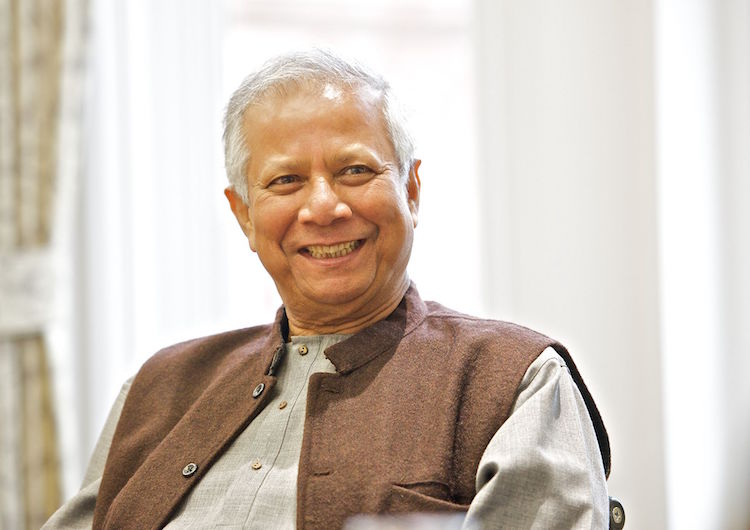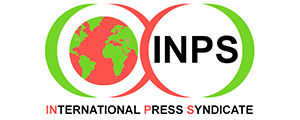
Viewpoint by Prof Muhammad Yunus*
DHAKA (IDN-INPS) – We are living in a time of unparalleled prosperity, fuelled in part by revolutions in knowledge, science, and technology, particularly information technology. This prosperity has changed the lives of many, yet billions of people still suffer from poverty, hunger, and disease. And now, food, oil price and financial crises have combined forces to bring even greater misery and frustration to the world bottom 3 billion people.
Sadly, however, we saw headlines reporting news of a sort many people assumed we would never experience again: skyrocketing prices for staple foodstuffs like grains and vegetables (wheat alone having risen in price by 200 percent since the year 2000); food shortages in many countries; rising rates of death from malnutrition and undernourishment; environmental threats to agricultural production; even food riots threatening the stability of countries around the globe.
Part of the problem has been the way in which globalization of food markets has been managed over the past three decades. I am a strong proponent of free trade; I believe that encouraging people and nations to exchange goods and services with one another will, in the long run, lead to greater prosperity for all. But like all markets, global markets need reasonable rules that will allow all participants an opportunity to benefit.
There is, indeed, a growing difficulty for farmers, particularly those in developing countries, to compete against large-scale producers in the increasingly global food markets.
It is a one-sided battle that, so far, has led to devastating results for the poor farmers of the world.
Increasing corporate control of agricultural resources is also harming farmers in the developing world. As large agribusinesses take near-monopoly control over seed stocks as well as control over supplies of costly synthetic fertilizers and pesticides, more and more small farms are driven out of business, unable to afford the supplies they need to compete in the new global food market.
The rising cost of oil is a significant factor here, too. For example, many fertilizers are petroleum-based, which means that every increase in the cost of a barrel of oil drives up the cost of fertilizer. The World Bank reports that, over the past five years, fertilizer prices have risen by 150 percent. Of course, high oil prices also drive up the cost of irrigation, running farm equipment, delivering goods to market, and shipping foods to and from processing plants.
Social Business: my experience with the Grameen Companies
Over the past three months, world leaders have been particularly focused on the emergency situation on the financial front only. But the present structure of economic system does not allow other dimensions of people, such as the human and social aspects, to play out in the market place. The human aspect of the financial crisis must be integrated into all policy proposals.
With this in mind, I am proposing a type of business to operate in the same market along with the existing profit maximizing businesses. I call this new type of business ‘social business’, because it exists for the collective benefit of others.
A social business is a business whose purpose is to address and solve social problems, not to make money for its investors. It is a non-loss non-dividend company. The investor can recoup his investment capital, but beyond that no profit is to be taken out as dividends by the investors.
These profits remain with the company and are used to expand its outreach, to improve the quality of the product or service it provides, and to design methods to bring down the cost of the product or service. If the efficiency, the competitiveness, and the dynamism of the business world can be harnessed to deal with specific social problems, the world will be a much better place.
The concept of social business is crystallized in my mind through my experience with the Grameen companies. Over the years, Grameen has created a series of companies to address different problems faced by the poor in Bangladesh.
Whether it is a company to provide renewable energy, a company to provide healthcare, or yet another company to provide information technology to the poor, we were always motivated by the need to address the social need.
We designed these businesses as profitable companies, but only to ensure their sustainability so that the products or services they provided could reach more and more of the poor – and on an ongoing basis. In all these cases, the social need was the only consideration; earning a profit was no consideration at all.
That is how I realized that businesses could be built that way, from the ground up, around specific social needs, without relying on the motive of personal gain.The concept of social business got international attention when Grameen Bank launched a joint venture with Danone, a multinational company from France. Grameen teamed up with Danone to bring nutritious fortified yogurt to the undernourished children of rural Bangladesh.
The aim of this social business is to fill the nutritional gap in the diet of these children. We sell the yogurt to the poor children at an affordable price, charging just enough to make the company self-sustaining. Beyond the return of the original investment capital, neither Grameen nor Danone will make any money from this venture, by agreement. We have one yogurt plant already operating in Bangladesh, and in time we hope to have 50 such plants throughout the country.
Grameen Danone is just the first social business we have launched. We also have built an eye care hospital on social business principles. And we have created a joint-venture with Veolia of France to deliver safe drinking water in the villages of Bangladesh.
This joint-venture is building a small water treatment plant to bring clean water to 50,000 villagers, in an area of Bangladesh where the existing water supply is highly contaminated by arsenic. We will sell the water at a very affordable price to the villagers to make the company sustainable, but no financial gain will come to Grameen or Veolia.
More and more companies now are coming forward to partner with us to set up new social businesses. We feel excited about creating a series of examples of social businesses, which, hopefully, will encourage others to join in.
Some people are sceptical when I describe the concept of social business. Who will create these businesses? Who will run these businesses? Why would anyone devote time, energy, and money to projects with no hope of personal gain?
I always say that people give away billions of dollars every year. So do donor countries. Imagine if those billions could be used by social businesses to help people. These billions would be recycled again and again, and the social impact could be much more powerful.
In the same way, money allocated by companies to corporate social responsibility projects could easily go into social businesses. Each company would create its own range of social businesses. We can also create Social Business Funds to pool funds from many sources and invest them in social businesses. The opportunities for launching social businesses are really limitless.
Microcredit for the poor, owned by the poor
Even profit maximizing companies can be social businesses if they are owned by the poor. This constitutes a second type of social business. Grameen Bank falls under this category of social business. It is owned by its poor borrowers.
The borrowers buy Grameen Bank shares with their own money, and these shares cannot be transferred to non-borrowers.
A committed professional team does the day-to-day running of the bank. Every year, dividend checks are sent to the borrowers, representing their share of the bank profits.
Bilateral and multi-lateral donors interested in supporting economic development could easily create social businesses of this type. When a donor wants to gives a loan or a grant to build a bridge in the recipient country, it could create instead a “bridge company” owned by the local poor.
A committed management company could be given the responsibility of running the company. Part of the profits earned by the company would go to the local poor as dividends, while part would go towards building more bridges. Many infrastructure projects, like roads, highways, airports, seaports, and utility companies could be built in this manner.
Social Wall Street, Social Bloomberg and Social Business Schools
To connect investors with social businesses, we will need to create a social stock market where only the shares of social businesses will be traded. An investor will come to this stock-exchange in order to find a social business, which has a mission to his or her liking, just as someone who wants to make money goes to the existing stock-market.
To enable a social stock-exchange to perform properly, we will need to create rating agencies, standardization of terminology, definitions, impact measurement tools, reporting formats, and new financial publications, such as, The Social Wall Street Journal, and new electronic media, such as, Social Bloomberg.
Business schools will offer courses and business management degrees to train young managers how to manage social businesses in the most efficient manner, and, most of all, to inspire them to become social business entrepreneurs themselves.
The Worst Crises Offer the Best Opportunities
The current mega-crisis should not distract donors and world leaders from the search for long-term global solutions. Instead, they should see this as a mega opportunity to address long-term problems in their integrated solution packages.
We can start introducing social businesses in the bail-out packages for the bottom 3 billion people, by creating a global social business fund to provide loans and equity for:
- Expanding microcredit programs
- Supporting other poverty reduction programs
- Providing technology infrastructure for the poor
- Improving agriculture in the developing world (through programs such as agricultural credit; local, national, and international marketing; storage; introduction of new technology; insurance; price and wage guarantees, and so on)
- Providing healthcare and health insurance
- Protecting the environment and providing renewable energy
- Making globalisation work for the poor
You Can Make It Happen!
We are fortunate enough to have been born in an age of great ideas and great technologies. A lot will rely on you, asking yourself, “What use do I want to make of my creative talent?” “Do you want to focus exclusively on making money?”
Alternatively, you could use your talent to change the world by harnessing the power of creative social business to address human and social needs.
You, the next generation, have to make a pledge that it will be your generation that will ensure the elimination of poverty from this planet. It is up to your generation to decide that the world you choose to live in will not contain the scourge of poverty, hunger, and disease.
*Prof Muhammad Yunus is the father of both social business and microcredit, the founder of Grameen Bank, and of more than 50 other companies in Bangladesh. For his constant innovation and enterprise, the Fortune Magazine named Professor Yunus in March 2012 as “one of the greatest entrepreneurs of our time”. In 2006, Professor Yunus and Grameen Bank were jointly awarded Nobel Peace Prize. This article first appeared in August 2016 issue of WFO F@rmletter, and is being reproduced by arrangement with them. [IDN-InDepthNews – 19 August 2016]
Photo: Nobel Laureate Prof. Muhammad Yunus. Credit: Wikimedia Commons.
IDN is flagship of the International Press Syndicate.

